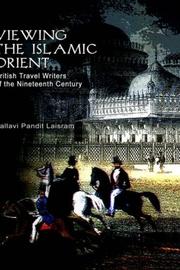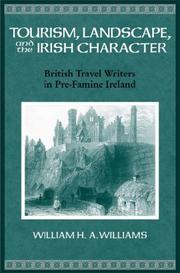| Listing 1 - 10 of 31 | << page >> |
Sort by
|
Book
ISBN: 9780198733782 Year: 2019 Publisher: Oxford Oxford University Press
Abstract | Keywords | Export | Availability | Bookmark
 Loading...
Loading...Choose an application
- Reference Manager
- EndNote
- RefWorks (Direct export to RefWorks)
Medieval English Travel: A Critical Anthology' is a comprehensive volume that consists of three sections: concise introductory essays written by leading specialists; an anthology of important and less well-known texts, grouped by destination; and a selection of supporting bibliographies organised by type of voyage. This anthology presents some texts for the first time in a modern edition. The first section consists of six companion essays on 'Places, Real and Imagined', 'Maps the Organsiation of Space', 'Encounters', 'Languages and Codes', 'Trade and Exchange', and 'Politics and Diplomacy'. The organising principle for the anthology is one of expansive geography. Starting with local English narratives, the section moves to France, en-route destinations, the Holy Land, and the Far East. In total, the anthology contains 26 texts or extracts, including new editions of Floris & Blancheflour, The Stacions of Rome, The Libelle of Englyshe Polycye, and Chaucer's Squire's Tale, in addition to less familiar texts, such as Osbern Bokenham's Mappula Angliae, John Kay's Siege of Rhodes 1480, and Richard Torkington's Diaries of Englysshe Travell.The supporting bibliographies, in turn, take a functional approach to travel, and support the texts by elucidating contexts for travel and travellers in five areas: 'commercial voyages', 'diplomatic and military travel', 'maps, rutters, and charts', 'practical needs', and 'religious voyages'.

ISBN: 9780415401159 Year: 2006 Publisher: London : Routledge,
Abstract | Keywords | Export | Availability | Bookmark
 Loading...
Loading...Choose an application
- Reference Manager
- EndNote
- RefWorks (Direct export to RefWorks)
Orientalism --- Travelers' writings, British --- History --- History and criticism.
Book
ISBN: 9780367265472 Year: 2020 Publisher: New York : Routledge,
Abstract | Keywords | Export | Availability | Bookmark
 Loading...
Loading...Choose an application
- Reference Manager
- EndNote
- RefWorks (Direct export to RefWorks)
This book outlines the contribution made by servants to domestic and Continental travel and travel writing between 1750 and 1850. Aiming to re-position British and European travel during this period as a site of work as well as leisure, Katheryn Walchester provides commentary and analysis of texts by servants not addressed in current scholarship. By reading texts contrapuntally, this book draws attention to repeated tropes and common patterns in the ways in which servants are featured in travelogues; and in so doing, offers an account of alternative modes of experiencing and writing about the Home Tour and the Grand Tour.
British --- British --- Household employees in literature. --- Household employees in literature. --- Travelers' writings, British --- Travelers' writings, British --- Travelers' writings, British. --- Travel --- History --- Travel. --- History and criticism --- History and criticism --- 1700-1899.
Book
ISBN: 9780198857952 0198857950 Year: 2020 Publisher: Oxford, United Kingdom Oxford University Press
Abstract | Keywords | Export | Availability | Bookmark
 Loading...
Loading...Choose an application
- Reference Manager
- EndNote
- RefWorks (Direct export to RefWorks)
The early modern period is often seen as a pivotal stage in the emergence of a recognizably modern form of the state. Agents beyond the State returns to this context in order to examine the literary and social practices through which the early modern state was constituted. The state was defined not through the elaboration of theoretical models of sovereignty but rather as an effect of the literary and professional lives of its extraterritorial representatives. Netzloff focuses on the textual networks and literary production of three groups of extraterritorial agents: travelers and intelligence agents, mercenaries, and diplomats. These figures reveal the extent to which the administration of the English state as well as definitions of national culture were shaped0by England's military, commercial, and diplomatic relations in Europe and other regions across the globe. Netzloff emphasizes the transnational contexts of early modern state formation, from the Dutch Revolt and relations with Venice to the role of Catholic exiles and nonstate agents in diplomacy and international law. These global histories of travel, service, and labor additionally transformed definitions of domestic culture, from the social relations of classes and regions to the private sphere of households and families. Literary writing and state service were interconnected in the careers of Fynes Moryson, George Gascoigne, and Sir Henry Wotton, among others. As they entered the realm of print and addressed a reading public, they introduced the practices of governance to an emerging public sphere.
English literature --- Travelers' writings, British --- History, Modern, in literature --- State, The --- History and criticism --- History --- Europe
Book
ISBN: 8860670012 9788860670014 Year: 2006 Publisher: La Spezia Agorà publishing
Abstract | Keywords | Export | Availability | Bookmark
 Loading...
Loading...Choose an application
- Reference Manager
- EndNote
- RefWorks (Direct export to RefWorks)
British --- French --- Travelers' writings, British --- Travelers' writings, French --- Sicily (Italy) --- Description and travel

ISBN: 1283486067 9786613486066 0299225232 9780299225230 0299225208 9780299225209 0299225240 9780299225247 9781283486064 661348606X Year: 2008 Publisher: Madison, Wis. University of Wisconsin Press
Abstract | Keywords | Export | Availability | Bookmark
 Loading...
Loading...Choose an application
- Reference Manager
- EndNote
- RefWorks (Direct export to RefWorks)
Travelers' writings, British --- British travelers' writings --- British literature --- History and criticism. --- Ireland --- Irish Free State --- Description and travel --- Historiography.
Book
ISBN: 9781032002958 9780367770730 9781003173571 Year: 2021 Publisher: London Routledge
Abstract | Keywords | Export | Availability | Bookmark
 Loading...
Loading...Choose an application
- Reference Manager
- EndNote
- RefWorks (Direct export to RefWorks)
Travelers' writings, British --- Visitors, Foreign --- History and criticism --- History --- Middle East --- South Asia --- Great Britain --- Description and travel --- Relations
Book
ISBN: 9781472458353 Year: 2016 Publisher: Farnham Ashgate
Abstract | Keywords | Export | Availability | Bookmark
 Loading...
Loading...Choose an application
- Reference Manager
- EndNote
- RefWorks (Direct export to RefWorks)
"Interrogating the multiple ways in which travel was narrated and mediated, by and in response to, nineteenth-century British travelers, this interdisciplinary collection examines to what extent these accounts drew on and developed existing tropes of travel. The three sections take up personal and intimate narratives that were not necessarily designed for public consumption, tales intended for a popular audience, and accounts that were more clearly linked with discourses and institutions of power such as imperial processes of conquest and governance. Some narratives focus on the things the travelers carried such as souvenirs from the battlefields of Britain's imperial wars, while others show the complexity of Victorian dreams of the exotic. Still others offer a disapproving glimpse of Victorian mores through the eyes of indigenous peoples in contrast to the imperialist vision of British explorers. Swiss hotel registers, guest books, and guidebooks offer insights into the history of tourism, while new photographic technologies, the development of the telegraph system, and train travel transformed the visual, audial, and even the conjugal experiences. The contributors attend to issues of gender and ethnicity in essays on women travelers, South African travel narratives, and accounts of China during the Opium Wars and analyze the influence of fictional travel narratives. Taken together, these essays show how these multiple narratives circulated, cross-fertilised, and reacted to one another to produce new narratives, new objects, and new modes of travel"--
Travelers' writings, British --- English prose literature --- British --- Literature and society --- Travel writing --- Travel in literature --- History and criticism --- History --- Great Britain --- Civilization
Book
ISBN: 1487510438 148751042X Year: 2018 Publisher: Toronto : University of Toronto Press,
Abstract | Keywords | Export | Availability | Bookmark
 Loading...
Loading...Choose an application
- Reference Manager
- EndNote
- RefWorks (Direct export to RefWorks)
In his book Fashioning the Canadian Landscape, J.I. Little examines how Canada, much like the United States, came to be identified with its natural landscape. Little argues that in contrast to America, Canada's image was strongly influenced by the picturesque convention favoured by British travel writers.
Tourism --- Travel --- Travelers' writings, British --- Travelers' writings, American --- National characteristics, Canadian --- Picturesque, The, in literature. --- Landscapes in literature. --- History --- History and criticism. --- Canada --- In literature. --- Description and travel.
Book
ISBN: 9781407305424 1407305425 Year: 2010 Volume: 2053 Publisher: Oxford Archaeopress
Abstract | Keywords | Export | Availability | Bookmark
 Loading...
Loading...Choose an application
- Reference Manager
- EndNote
- RefWorks (Direct export to RefWorks)
"This work focuses on three important British travellers to Crete during the 18th and 19th centuries to establish whether or not they made any significant contribution to the field of research with regard to the archaeological heritage of Bronze Age Crete. It brings these 'lost pioneers' of antiquity to the fore and to recognize their efforts as part of the foundation of the discovery of the island's Bronze Age archaeology prior to the groundbreaking excavations of Sir Arthur Evans. They are Richard Pococke (1704-65), Robert Pashley (1805-59) and Thomas Spratt (1811-88). Having dealt with the terms that these travellers used in describing ancient remains, the work looks briefly at the background to Bronze Age Crete itself. Thereafter the development from antiquarianism into archaeology is followed to establish the motives behind these travellers' wanderings in Crete. Consideration is given to whether any sites they described might have been of the Bronze Age and, in addition, various views of the mythical Labyrinth are looked at in an attempt to compound the theory that there may have been a certain belief in a period prior to the known Classical era (of the 5th century BC Greece). Questions answered include: How do the travellers' 'field surveys' and discoveries compare with what is now known today from excavation? Were some of their references to 'Cyclopean' stonework an identification of Bronze Age architecture? Do they deserve recognition for the identification of a prehistory of Crete? Why are their names missing from so many books on the history of archaeology and the discovery of Cretan archaeology? This work brings together, for the first time, an understanding of the views and comparative discoveries of three 18th and 19th century travellers of the, then, unknown ancient pre-history of Bronze Age Crete"--Publisher's web site.
Bronze age --- Excavations (Archaeology) --- Travelers' writings, British. --- Antiquities, Prehistoric --- Age du bronze --- Fouilles (Archéologie) --- Ecrits de voyageurs britanniques --- Antiquités préhistoriques --- Pococke, Richard, --- Pashley, Robert, --- Spratt, T. A. B. --- Travel --- Fouilles (Archéologie) --- Antiquités préhistoriques
| Listing 1 - 10 of 31 | << page >> |
Sort by
|

 Search
Search Feedback
Feedback About UniCat
About UniCat  Help
Help News
News